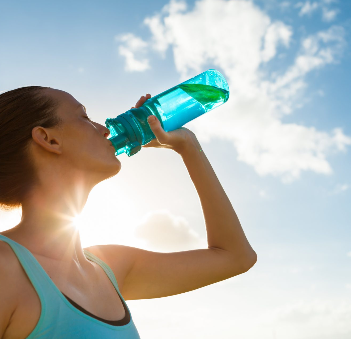
Dehydration
 If your body doesn’t have enough fluids to function, you will become
dehydrated. While you can cure mild dehydration by drinking more fluids,
moderate to severe dehydration can quickly turn into an emergency.
If your body doesn’t have enough fluids to function, you will become
dehydrated. While you can cure mild dehydration by drinking more fluids,
moderate to severe dehydration can quickly turn into an emergency.
If you’re experiencing symptoms of dehydration, call 911 or visit Legacy ER & Urgent Care. With convenient locations throughout the Dallas-Fort Worth area, we are just a short drive away. Once you arrive, we can rehydrate you so you can avoid dangerous health complications.
Dehydration Symptoms
There are numerous signs of dehydration. Common symptoms include:
- Dehydration headache
- Thirst
- Fatigue
- Lightheadedness
- Muscle cramps
- Dry mouth, tongue, and skin
- Reduced urine production
- Dark yellow or light brown urine
- Increased heart rate
- Rapid breathing
When to Visit the Emergency Room
You should call 911 or visit the nearest emergency room if you experience signs of a severe dehydration reaction. These dehydration symptoms include:
- Weakness
- Confusion
- Dizziness
- Fainting
- Mucus or blood in diarrhea
- Blood in vomit
- Swollen or painful abdomen
- Inability to keep down fluids
Your condition can get worse quickly if you’re severely dehydrated. If you wait too long to seek treatment, dehydration can cause a serious medical problem.
Treating Dehydration at Home
You can use an oral rehydration solution to treat dehydration in infants and children who have fever, vomiting, or diarrhea. These solutions are available over the counter and contain salts and water to replace lost electrolytes and fluids. You need to provide one teaspoon of the solution every 1-5 minutes.
Older children can rehydrate with sports drinks diluted with 50 percent water. Have young children slowly sip the diluted sports drink to replenish fluids and electrolytes.
Adults with vomiting, fever, and diarrhea can also drink sports drinks to rehydrate. You should try to drink two quarts of fluid within four hours.
If you tolerate the fluids, your body will begin to rehydrate. Most people start feeling better within a few hours. However, it can take up to 36 hours to completely rehydrate. Thus, you need to continue drinking liquids during that time. While intaking liquids, be mindful of your symptoms to ensure they are improving.
While oral hydration takes up to 36 hours, intravenous rehydration works much faster. If you are severely dehydrated, visit Legacy ER & Urgent Care so we can assess your condition and provide the necessary fluids. We can also address the cause of dehydration so you don’t become ill once again. After rehydrating and addressing the cause, you should feel much better.
